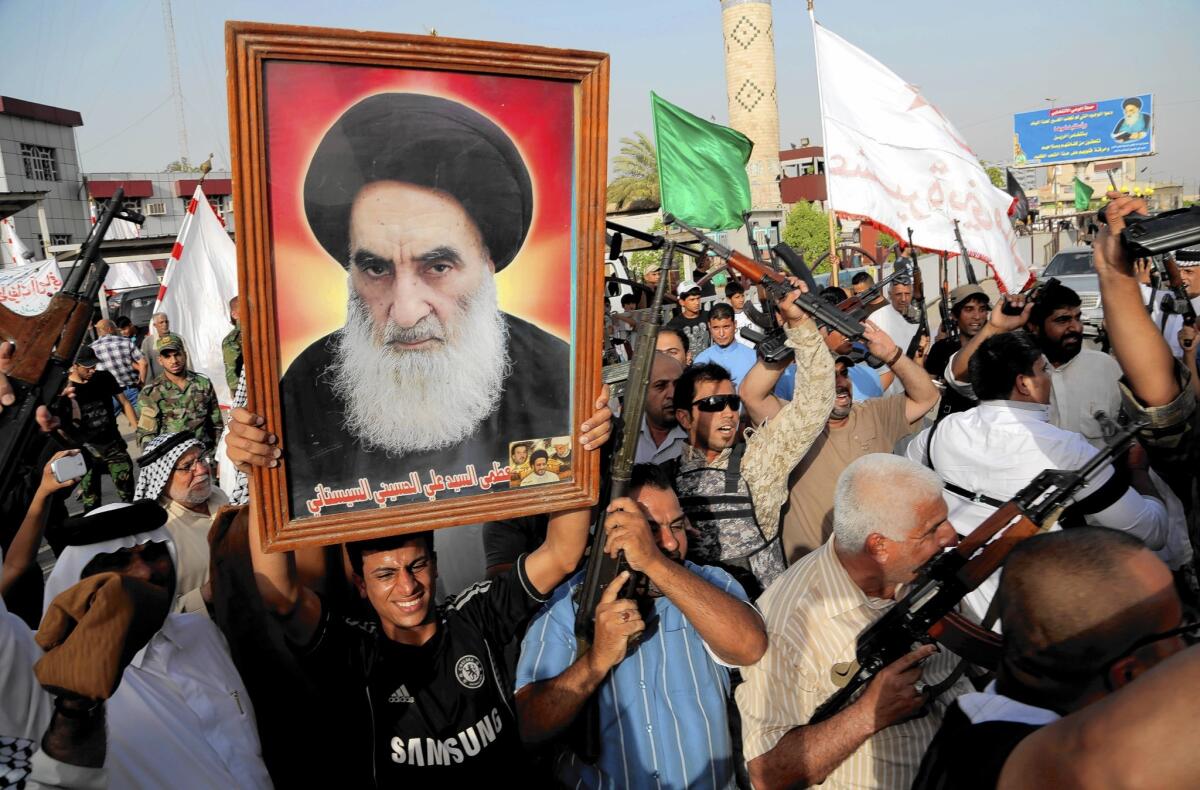Influential Iraqi cleric calls for inclusive government

Wading into the debate over Prime Minister Nouri Maliki’s political future, Iraq’s top Shiite Muslim cleric on Friday urged lawmakers to form “an effective government” that would lead the country out of its gravest crisis since the departure of U.S. troops in 2011.
Grand Ayatollah Ali Sistani said political parties must create a government “that enjoys broad national acceptance [and] that reverses past mistakes,” a veiled rebuke of Maliki, a Shiite hard-liner whose marginalization of minority Sunni Muslims has stoked an insurgency that has driven government forces out of much of northern and western Iraq.
Sistani did not call for Maliki to step down. However, he said a new government, to be formed after a court this week certified the results of April parliamentary elections, must be inclusive.
“We call on the politicians to put all Iraqis on the same level, to stand against” the insurgents, Sistani said in his weekly Friday sermon, read by an aide and broadcast from the holy city of Karbala. He referred to the insurgents as “apostates.”
The comments by Iraq’s most influential religious leader were the latest sign of pressure on Maliki, who has shown no indication of giving up an office he has held for eight years. President Obama on Thursday urged the prime minister to make serious concessions to his political rivals, including Sunni Arabs and ethnic Kurds, even as the American leader pledged to dispatch as many as 300 military advisors to support Maliki’s armed forces.
U.S. officials have also begun meeting privately with Maliki opponents in Baghdad, the Iraqi capital, in a sign that the Obama administration may be looking for ways to promote a new prime minister.
Sistani also sought to clarify his remarks last week that called on Iraqis to take up arms against the insurgents, who have been led by the Islamic State of Iraq and Syria, or ISIS, an Al Qaeda splinter group. Thousands of mainly Shiite volunteers rushed to training camps in Baghdad and other cities after Sistani’s comments June 13, provoking fear, particularly among minority Sunnis, of a return to the sectarian civil war that ripped through Iraq after the U.S.-led invasion in 2003.
After a spate of sectarian killings around Baghdad in recent days, Sistani said that his call for volunteer fighters was “directed to all the citizens, without being specific to one sect to the exclusion of another,” and that the volunteers must work alongside the armed forces, a nod to the private sectarian militias that terrorized Baghdad during the civil war.
“We don’t stand with any organization or militias that are not authorized within the law,” Sistani said.
Pro-government forces clashed Friday with Sunni insurgents in various parts of Iraq. The semiofficial Iraqiya news channel quoted Maliki spokesman Qassim Atta as saying that scores of “terrorists” — the government’s standard description of the insurgents — had been killed around the city of Baqubah, about 35 miles northeast of Baghdad.
Pro-government forces also continued fighting with insurgents in Baiji, home to Iraq’s largest oil refinery, about 125 miles north of Baghdad, as gas and fuel shortages continued for a fourth day in the northern provinces.
The government says it controls the vital energy installation, though ISIS supporters posted images on social media of the group’s black flag flying over the site.
Iraqi state media also published the name of a Saudi national, Khaled Hilaaly, whom it said had been killed in clashes with security forces in Salahuddin province. Brig. Gen. Sabaah Fitlawy told local news media that Hilaaly was the top ISIS commander in the area.
Saudi state media did not respond to the statement. The countries have been trading blame for Iraq’s deteriorating security situation, with Maliki accusing Sunni-led Saudi Arabia of inciting sectarian tension in neighboring Iraq. Saudi officials dismissed the charges.
Times staff writer Bengali reported from Baghdad and special correspondent Bulos from Irbil, Iraq.
More to Read
Start your day right
Sign up for Essential California for news, features and recommendations from the L.A. Times and beyond in your inbox six days a week.
You may occasionally receive promotional content from the Los Angeles Times.







